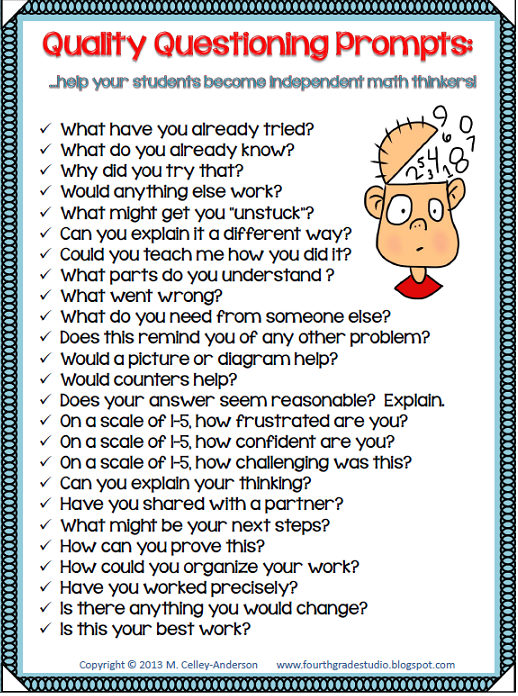Parents as Questioners

Mathematical investigations present new and sometimes unexpected mathematical situations, so the teacher cannot have taught the way to solve the problem in advance. The student needs to apply prior knowledge in ways that make sense to the situation. There may be many paths to follow and many outcomes, depending on the problem; the student must make his or her own plan for finding the solution.
Parents can assist their children to be independent problem solvers by becoming guides or questioners. They do not need to know how to solve the problem themselves, but can help the students think through the problem and make a realistic plan for solving it.
USE FREELY any questions that will help students think about the way they are tackling the problem:
· What have you tried?
· Is there another way to look at the problem?
· Can you explain this to me?
· What makes sense so far?
· Is there another way to think about it?
· Is this like any other problem that you have worked on in any way?
· What is it you are trying to do/solve/find out?
USE SPARINGLY those questions that tend to direct student’s thinking:
· How might you organize this?
· Can you make a table of your results?
· Can you see any patterns?
· Have you tried smaller (or simpler) cases?
· How can you start?
· Have you checked to see that the solution works?
· What would happen if…?
AVOID any hint or question referring to the particular problem:
· Do you recognize square numbers?
· Explore it like this…
· Why not try three counters?
· That’s not quite what I had in mind…
· No, you should…
Parents can assist their children to be independent problem solvers by becoming guides or questioners. They do not need to know how to solve the problem themselves, but can help the students think through the problem and make a realistic plan for solving it.
USE FREELY any questions that will help students think about the way they are tackling the problem:
· What have you tried?
· Is there another way to look at the problem?
· Can you explain this to me?
· What makes sense so far?
· Is there another way to think about it?
· Is this like any other problem that you have worked on in any way?
· What is it you are trying to do/solve/find out?
USE SPARINGLY those questions that tend to direct student’s thinking:
· How might you organize this?
· Can you make a table of your results?
· Can you see any patterns?
· Have you tried smaller (or simpler) cases?
· How can you start?
· Have you checked to see that the solution works?
· What would happen if…?
AVOID any hint or question referring to the particular problem:
· Do you recognize square numbers?
· Explore it like this…
· Why not try three counters?
· That’s not quite what I had in mind…
· No, you should…
Helping your child with Math
Be a learner yourself:
· Learn to play with numbers using mental arithmetic.
· Play mathematical games at home that involve problem solving.
· Notice when you use mathematics in your everyday life and share this with your child.
· Demonstrate that you value persistence.
· Get to know the research on mathematics education.
Be a researcher:
· Become a "question poser".
· Be curious about your child’s thinking when they are doing math.
· Be a thoughtful listener.
· Ask questions that help you understand your child’s thinking.
· Know that teaching by telling is not how people learn mathematics.
Be a communicator:
· Recognize how important talking and writing is to learning mathematics.
· Talk with your child about the many ways to think about math problems.
· Encourage diverse ways of solving problems.
· Learn to play with numbers using mental arithmetic.
· Play mathematical games at home that involve problem solving.
· Notice when you use mathematics in your everyday life and share this with your child.
· Demonstrate that you value persistence.
· Get to know the research on mathematics education.
Be a researcher:
· Become a "question poser".
· Be curious about your child’s thinking when they are doing math.
· Be a thoughtful listener.
· Ask questions that help you understand your child’s thinking.
· Know that teaching by telling is not how people learn mathematics.
Be a communicator:
· Recognize how important talking and writing is to learning mathematics.
· Talk with your child about the many ways to think about math problems.
· Encourage diverse ways of solving problems.

